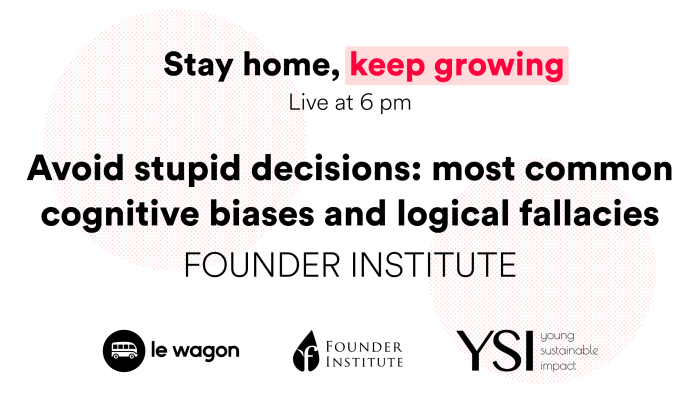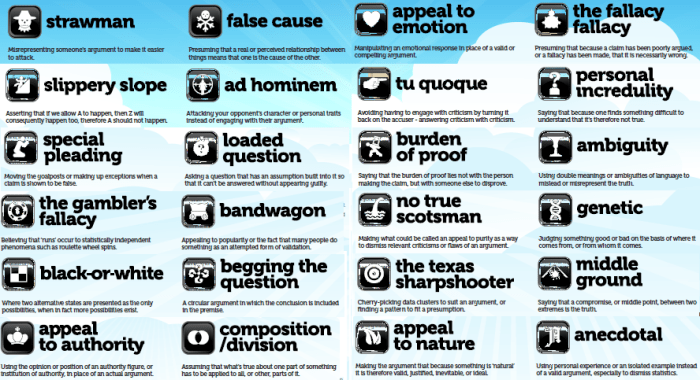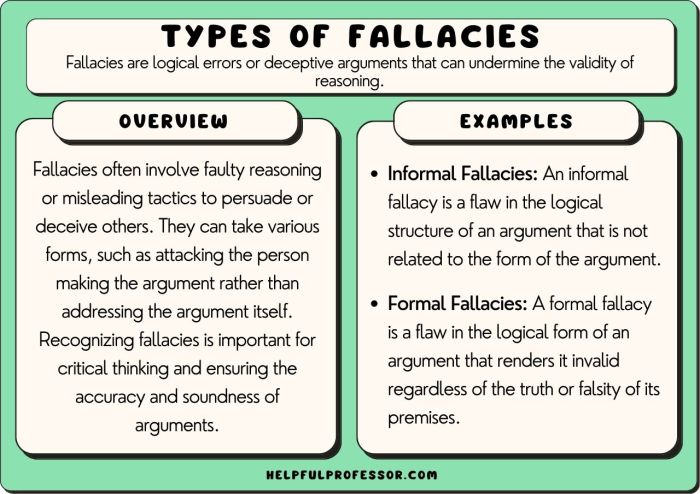Basic sentential logic informal fallacies and cognitive biases – Delving into the realm of basic sentential logic, informal fallacies, and cognitive biases, this discourse embarks on an intellectual journey to unravel the intricate interplay of these concepts. Sentential logic provides the foundational framework for evaluating the validity of arguments, while informal fallacies represent common pitfalls that can lead to erroneous reasoning.
Cognitive biases, on the other hand, are systematic deviations from rational thinking that can significantly influence our decision-making and understanding of the world.
Through a comprehensive examination of these concepts, we will gain insights into the mechanisms of logical reasoning, identify and avoid fallacies in argumentation, and understand the impact of cognitive biases on our thinking. This exploration will equip us with the critical tools necessary to navigate the complexities of human reasoning and communication.
Basic Sentential Logic

Sentential logic, also known as propositional logic, is a formal system that deals with the logical relationships between propositions. Propositions are statements that are either true or false, such as “The sky is blue” or “2+2=4”. Connectives are logical operators that combine propositions to form more complex statements, such as “and”, “or”, and “not”.
Truth tables are used to determine the truth value of a compound statement for all possible combinations of truth values of its component propositions. The rules of inference in sentential logic allow us to derive new statements from a set of given statements.
Connectives and Truth Tables
- Conjunction (∧):True if both propositions are true, false otherwise.
- Disjunction (∨):True if at least one proposition is true, false if both are false.
- Negation (¬):True if the proposition is false, false if the proposition is true.
| p | q | p ∧ q | p ∨ q | ¬p |
|---|---|---|---|---|
| T | T | T | T | F |
| T | F | F | T | F |
| F | T | F | T | T |
| F | F | F | F | T |
Rules of Inference
- Modus Ponens:If p → q and p, then q.
- Modus Tollens:If p → q and not q, then not p.
- Hypothetical Syllogism:If p → q and q → r, then p → r.
Informal Fallacies
Informal fallacies are errors in reasoning that occur when an argument is based on faulty logic or evidence. They are often used intentionally to deceive or persuade others, but they can also occur unintentionally due to cognitive biases or a lack of critical thinking skills.
Common Informal Fallacies
- Ad Hominem:Attacking the person making the argument instead of addressing the argument itself.
- Straw Man:Misrepresenting the opposing argument to make it easier to attack.
- Slippery Slope:Assuming that a small step will lead to a series of increasingly negative consequences.
- Begging the Question:Assuming the truth of the conclusion in the premises.
- Circular Reasoning:Using the conclusion to support one of the premises.
Recognizing and Avoiding Informal Fallacies
- Be aware of the common informal fallacies and their characteristics.
- Critically evaluate arguments for logical flaws and unsupported claims.
- Consider alternative perspectives and interpretations.
- Avoid making assumptions and relying on emotional appeals.
Cognitive Biases

Cognitive biases are systematic errors in thinking that occur when our brains make shortcuts to process information quickly and efficiently. While these shortcuts can be helpful in some situations, they can also lead to inaccurate judgments and poor decision-making.
Common Cognitive Biases
- Confirmation Bias:Seeking out information that confirms our existing beliefs and ignoring information that contradicts them.
- Anchoring Bias:Relying too heavily on the first piece of information we receive, even if it is inaccurate or incomplete.
- Availability Bias:Overestimating the likelihood of events that are easily recalled or imagined.
- Hindsight Bias:Believing that we could have predicted an event after it has already occurred.
Impact on Decision-Making and Reasoning
- Cognitive biases can lead to poor decision-making by influencing our perception of risks and benefits.
- They can also make us more susceptible to persuasion and manipulation.
- Understanding cognitive biases can help us make more rational and informed decisions.
Interrelation of Basic Sentential Logic, Informal Fallacies, and Cognitive Biases

Basic sentential logic provides a framework for analyzing the logical structure of arguments. This can help us identify informal fallacies, which are often based on faulty logical reasoning.
Cognitive biases can lead to informal fallacies by influencing the way we interpret and evaluate information. For example, confirmation bias can lead us to accept arguments that support our existing beliefs, even if they are based on faulty logic.
Examples, Basic sentential logic informal fallacies and cognitive biases
- An argument that uses the slippery slope fallacy may be based on the cognitive bias of availability bias, where we overestimate the likelihood of negative consequences.
- An argument that uses the ad hominem fallacy may be based on the cognitive bias of confirmation bias, where we seek out information that confirms our existing beliefs about the person making the argument.
Q&A: Basic Sentential Logic Informal Fallacies And Cognitive Biases
What is the difference between a formal and informal fallacy?
Formal fallacies are errors in reasoning that can be identified based on the structure of the argument, regardless of the content. Informal fallacies, on the other hand, are errors that arise from the content or context of the argument, rather than its logical form.
How can cognitive biases affect our decision-making?
Cognitive biases can lead us to make decisions based on incomplete or inaccurate information, overvalue certain types of evidence, or ignore relevant factors. They can also make us more susceptible to persuasion and manipulation.
What is the role of sentential logic in evaluating arguments?
Sentential logic provides a formal framework for representing and analyzing the structure of arguments. It allows us to determine whether an argument is valid or invalid based on the logical relationships between its premises and conclusion.